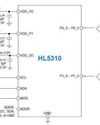
Circa 1988, Steve Ciarcia, long time featured columnist for BYTE magazine, broke away to roll out his own magazine, Circuit Cellar INK(CCI), focusing on embedded computer applications. As Editorial Director, Steve's first editorial, "Inside the Box Still Counts," prompted us to ponder the "premise that we needed to further the education of those individuals intelligent enough to recognize that sometimes it is very important to know EXACTLY what's in the box and how it works."[1] A close circle of friends was invited to assist him in presenting interesting fodder to those individuals who shared like views and were looking for sources of further education.
Editors for that first bimonthly issue included Harv Weiner, Kenneth Davidson, Jeff Bachiochi, Thomas Cantrell and Edward Nisley. Feature articles were authored by Steve, Ed, and Mark Voorhees.
By the end of that first year, I was asked to contribute a new column, "From the Bench," to be run for the first time in issue 5. Its objective was to offer breaking information on new technologies that help make designs cost effective, reliable, and easier to implement.
My first column, "RS-232 Economic Tradeoffs: Board Space vs. Parts Count vs. Parts Co$t," [2] introduced Maxim's MAX232. At the time, we had separate RS232 transmitters and receivers that required additional +12V power supplies. The Maxim device incorporated transmitters, receivers, and power supply doubler/inverter, allowing a single device to handle TTL to RS-232 signallevel conversion with only a 5V supply.
Over the next 4 years, while CCI remained a bimonthly magazine (six issues a year), it wasn't a big challenge to continue my column.
At this time, a programmable microcontroller was only a glimmer in the eyes of many.
This story is from the {{IssueName}} edition of {{MagazineName}}.
Start your 7-day Magzter GOLD free trial to access thousands of curated premium stories, and 9,000+ magazines and newspapers.
Already a subscriber ? Sign In
This story is from the {{IssueName}} edition of {{MagazineName}}.
Start your 7-day Magzter GOLD free trial to access thousands of curated premium stories, and 9,000+ magazines and newspapers.
Already a subscriber? Sign In

Renesas New RA8 Entry-Line MCU Groups Brings High Performance of Arm Cortex-M85 Processor to Cost-Sensitive Applications with Market-Leading CoreMark Performance
Renesas Electronics Corp., a premier supplier of advanced semiconductor solutions, introduced the RA8E1 and RA8E2 microcontroller (MCU) groups, extending the industry's most powerful series of MCUs.

Same Sky Expands AMT Absolute Encoder Line to Support Larger Shaft Sizes
Same Sky's Motion & Control Group announced the addition of a new series to its innovative AMT absolute encoder family designed to support larger motor shaft sizes from 9mm to 15.875mm (5/8 inch).

XP Power Launches New Series of Low-Profile, Baseplate-Cooled DC-DC Brick Converters
The RDF150 and RDF200 series are the latest additions to the RDF series of low-profile, baseplate-cooled, ultra-wide input DC-DC brick converters, which is already available in power outputs of 25W and 50W.

HMI Introduces Ultra-Low Voltage 12-bit GPIO Expander with Interrupt Output
HMI, a leading provider of advanced analog and power management technologies, announced the launch of its HL5310, an innovative ultra-low voltage 12-bit GPIO expander featuring interrupt output.

The Future of Embedded Chip Design Navigating the Chip Creation Space
Custom Silicon at Lower Cost, Reduced Development Time

The Long and Winding Road
From Maxim's RS-232 to WeMos ESP32: So Much to Do, So Little Time

Start to Finish Driving LCDs
Lumex Display with Microchip Driver for a TI MCU

Easing the Path for App Releases
Managed Development of React Native with Expo

Datasheet: Tiny Embedded Boards
Deliver Power, Performance, and Versatility in Meager Square Millimeters

Harvesting Ambient Energy
Hybrid Power Sources Cut IoT Battery Dependency